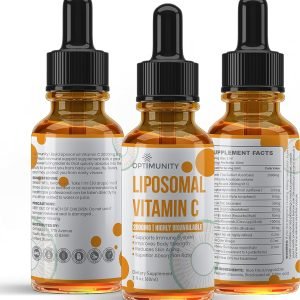Vitamin C, also known as ascorbic acid, is a water-soluble vitamin that plays a crucial role in various bodily functions. This essential nutrient is renowned for its antioxidant properties, which help neutralize harmful free radicals and protect cells from oxidative stress.
Vitamin C is also involved in collagen production, wound healing, and immune system support. Despite its abundance in many fruits and vegetables, such as citrus fruits, bell peppers, and broccoli, many individuals still struggle to meet their daily vitamin C requirements.
This is where vitamin C supplements come into play, providing an easy and convenient way to ensure adequate intake of this vital nutrient.
What is Buffered Vitamin C?
Buffered vitamin C, also known as buffered ascorbic acid or buffered ascorbate, is a specific form of vitamin C supplement designed to enhance absorption and reduce potential gastrointestinal discomfort.
Unlike regular vitamin C supplements, which can be highly acidic, buffered vitamin C is formulated with additional compounds called buffering agents.
The buffering process involves combining ascorbic acid with mineral salts or alkaline substances, such as calcium, magnesium, or potassium salts. These buffering agents help neutralize the acidity of ascorbic acid, resulting in a more pH-balanced and stomach-friendly supplement.
Compared to regular vitamin C supplements, buffered vitamin C is often better tolerated, especially at higher dosages, as it is less likely to cause stomach irritation or digestive discomfort.
Science Behind Buffered Vitamin C
To understand the rationale behind buffered vitamin C, it’s essential to explore the concept of acid-base balance and pH. The human body maintains a delicate balance of acidity and alkalinity, with the optimal pH range for most bodily functions being slightly alkaline.
Vitamin C, in its natural form (ascorbic acid), is an acidic compound. When consumed in high doses or on an empty stomach, regular vitamin C supplements can potentially disrupt the stomach’s pH balance, leading to digestive discomfort, heartburn, or even stomach ulcers in some individuals.
The buffering process addresses this issue by neutralizing the acidity of ascorbic acid, making it more pH-balanced and easier for the body to absorb and utilize.
By reducing the acidity, buffered vitamin C supplements are less likely to cause irritation in the gastrointestinal tract, allowing for better tolerance and potentially higher dosing when necessary.
Benefits of Buffered Vitamin C
Improved Absorption and Bioavailability
One of the primary benefits of buffered vitamin C is its enhanced absorption and bioavailability. By neutralizing the acidity, the vitamin C is better able to pass through the stomach and into the small intestine, where it can be more efficiently absorbed into the bloodstream.
Reduced Gastrointestinal Discomfort
For individuals with sensitive stomachs or those prone to acid reflux or heartburn, buffered vitamin C can be a game-changer.
By minimizing irritation and discomfort in the gastrointestinal tract, buffered vitamin C supplements can be taken without the unpleasant side effects often associated with regular vitamin C supplements.
Enhanced Tolerance for Higher Doses
In certain situations, higher doses of vitamin C may be required, such as during periods of increased stress, illness, or for specific therapeutic applications. Buffered vitamin C allows for better tolerance of these higher doses, reducing the risk of gastrointestinal distress and enabling more effective supplementation.
Potential Antioxidant Benefits
While the antioxidant properties of vitamin C are well-established, some research suggests that buffered forms of vitamin C may offer additional antioxidant benefits. The buffering agents used in these supplements may contribute to their overall antioxidant capacity, potentially enhancing their protective effects against oxidative stress.
Choosing the Right Buffered Vitamin C Supplement
With the growing popularity of buffered vitamin C supplements, it’s essential to exercise caution and make informed choices when selecting a product. Here are some factors to consider:
Quality and Reputation
Look for supplements from reputable brands with a proven track record of quality and transparency. Trusted manufacturers should adhere to strict quality control standards and provide detailed information about their products’ composition and manufacturing processes.
Dosage and Form
Buffered vitamin C supplements are available in various dosages and forms, including capsules, tablets, powders, and liquids. Consider your individual needs and preferences when choosing the appropriate dosage and form.
Buffering Agents
Pay attention to the specific buffering agents used in the supplement. Common choices include calcium, magnesium, potassium, and sodium salts. Some individuals may have preferences or sensitivities to certain buffering agents, so read labels carefully.
Reading and Understanding Labels
Thoroughly read and understand the supplement labels, paying close attention to the ingredients, dosages, and any additional claims or certifications (e.g., non-GMO, vegetarian/vegan, allergen-free).
Consulting Healthcare Professionals
If you have any underlying health conditions, are taking medications, or have specific concerns, consult with a healthcare professional, such as a doctor or registered dietitian, before incorporating buffered vitamin C supplements into your routine.
Buffered Vitamin C vs. Liposomal Vitamin C

While buffered vitamin C has gained popularity for its improved absorption and reduced gastrointestinal discomfort, another form of vitamin C has emerged as a potential alternative: liposomal vitamin C.
Liposomal vitamin C is a unique delivery system in which vitamin C molecules are encapsulated within tiny lipid (fat) particles called liposomes. These liposomes are designed to protect the vitamin C from degradation and facilitate its absorption into the cells.
The liposomal encapsulation process involves mixing vitamin C with phospholipids, which are the primary components of cell membranes. This creates a lipid bilayer structure that encapsulates the vitamin C molecules, mimicking the structure of cell membranes.
Absorption and Bioavailability
One of the primary advantages of liposomal vitamin C is its enhanced absorption and bioavailability compared to regular vitamin C supplements. The liposomal delivery system allows vitamin C to bypass the digestive system and enter the cells more efficiently.
Unlike regular vitamin C, which is absorbed through the gut and can be limited by saturation kinetics, liposomal vitamin C can be taken up directly by the cells, potentially increasing its overall bioavailability.
Reduced Gastrointestinal Discomfort
Similar to buffered vitamin C, liposomal vitamin C is less likely to cause gastrointestinal discomfort or irritation. Since the vitamin C is encapsulated within the liposomes, it does not come into direct contact with the stomach lining, reducing the risk of stomach upset or acidity.
Potential Applications
Liposomal vitamin C has shown promising potential in various applications, including:
- Enhanced Immune Support: The improved cellular absorption of liposomal vitamin C may enhance its immune-boosting properties by increasing the availability of vitamin C to immune cells.
- Cancer Therapy: Some research suggests that liposomal vitamin C may have therapeutic applications in cancer treatment, potentially increasing the efficacy of certain chemotherapeutic agents.
- Skin Health: Liposomal vitamin C has been explored for its potential benefits in skin care, as it may improve the delivery of vitamin C to skin cells, promoting collagen production and reducing oxidative stress.
Frequently Asked Questions
How does buffered vitamin C improve absorption?
By neutralizing the acidity of ascorbic acid, buffered vitamin C supplements create a more pH-balanced environment, which can enhance the absorption and bioavailability of vitamin C.
The buffering agents help protect the vitamin C from being degraded or neutralized by the stomach’s acidic environment, allowing more of it to reach the small intestine for optimal absorption.
Is buffered vitamin C better than regular vitamin C?
Buffered vitamin C is not necessarily “better” than regular vitamin C, but it does offer certain advantages. For individuals who experience gastrointestinal discomfort or have difficulty tolerating high doses of regular vitamin C supplements, buffered vitamin C can be a more gentle and easily tolerated alternative. However, both forms provide the same essential nutrient and antioxidant benefits of vitamin C.
Can I take buffered vitamin C if I have a sensitive stomach?
Yes, buffered vitamin C is often recommended for individuals with sensitive stomachs or those prone to acid reflux or heartburn. By reducing the acidity of vitamin C, buffered supplements are less likely to cause irritation or discomfort in the gastrointestinal tract.
Are there any side effects associated with buffered vitamin C?
Buffered vitamin C is generally well-tolerated and has a favorable safety profile when taken at recommended dosages. However, excessive intake of vitamin C, even in buffered forms, can lead to gastrointestinal disturbances, such as diarrhea, abdominal cramps, and nausea. It is important to follow the recommended dosages and instructions provided by the manufacturer or your healthcare professional.
Conclusion
Buffered vitamin C represents a significant advancement in the world of vitamin C supplementation, offering a more gentle and easily absorbed alternative to traditional ascorbic acid supplements.
By neutralizing the acidity of vitamin C through the use of buffering agents, buffered vitamin C provides a pH-balanced and stomach-friendly solution for individuals seeking the numerous benefits of this essential nutrient.
From improved absorption and bioavailability to reduced gastrointestinal discomfort and enhanced tolerance for higher dosages, buffered vitamin C offers a range of advantages over regular vitamin C supplements. Additionally, specific forms like buffered ascorbate provide added benefits from the mineral salts used as buffering agents.
While buffered vitamin C is generally considered safe and well-tolerated, it’s important to exercise caution and consult with healthcare professionals, especially for individuals with underlying health conditions or taking medications.











